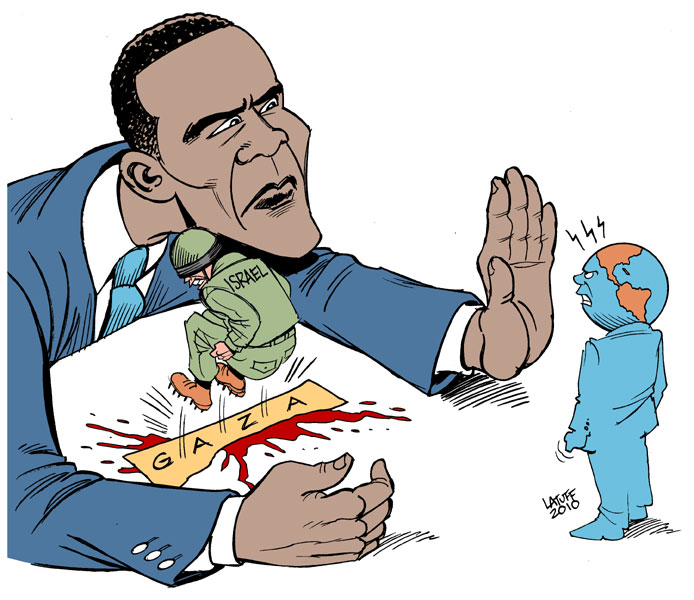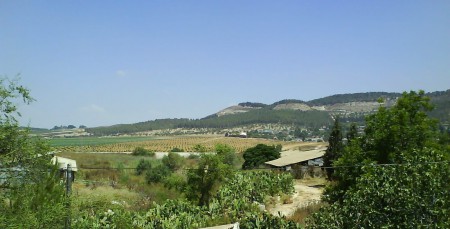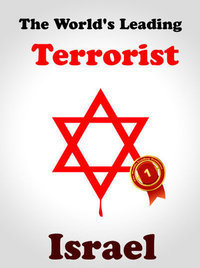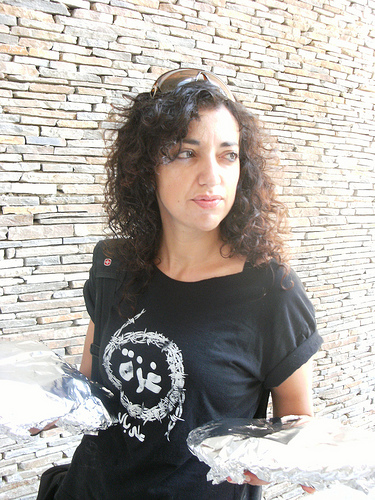
EDITOR: The masters of the blockade allow in canned fruit!
What a great victory… Palestinians now are allowed humus in tins, as well as canned peaches. One does not quite know if we should laugh or cry. After all, even Israel, crazy as it is, cannot quite claim that canned peaches were banned for over three years because of security reasons. This was done in order to make the life of Gazans a real misery, on the daily level, and to leave them on a mere subsistence level, which should weaken and dispirit them, and designed to make them rebel against Hamas. Olmert, the war criminal who is also an everyday criminal, having been caught and tried over corruption charges, has called this “putting Gaza ona diet”. Jewish humour is not what ir was, it seems. From the black humour of the oppressed, it turned into the gallows humour of the exectioners. This announcement now is useful in derailing the ongoing debate about the flotilla massacre, and putting a ‘good news’ item on the media agenda. Westerners are fickle, as we know, and anyway, are now mainly into following the world cup, so it is good time to bury bad news.
That did not happen, like so many other things that Israel planned; The Gazans did not rebel against Hamas. Instead, they rose against their real oppressor, Israel. So why this change now? A simple throwaway to Obama, so he can show some ‘achievment’ for his time in office. It is also the first time a US president can count on canned fruit as a ‘real achievement’. For Gazan, however, this might be welcome, as a brief repreieve from their imposed starvation. Most of them, having no income or work, would not even be able to enjoy this change…
Israel eases blockade by letting in extra food items: The Independent
By Donald Macintyre
Thursday, 10 June 2010
Israel has eased its regime for food imports to Gaza, allowing foods like a range of herbs, biscuits, jam, potato crisps, packaged hummus and canned fruits which had been banned from entering the territory from Israel for three years.
But the relaxation – which also allows in razors – fell far short of the much wider lifting of the economic blockade which has been increasingly urged by the international community since last week’s lethal naval commando raid on a pro-Palestinian aid flotilla.
The British Government among others has been urging Israel to consider a substantially new approach to policy, which would spur post-war reconstruction and revive Gaza’s private sector economy, paralysed when Israel imposes its blockade after Hamas’s seizure of full control in the Strip in June 2007.
The Israeli human rights agency Gisha said yesterday that it was “pleased to learn that coriander no longer presents a threat to Israeli security” but added that Israel continued to prevent the transfer of “purely civilian goods” like fabrics, fishing rods, food wrappers, and raw materials for manufacturing including industrial margarine and glucose.
These were being barred “as part of what Israel calls ‘economic warfare'” and so “denies 1.5 million human beings the right to engage in productive, dignified work.”
The foodstuffs relaxation came to light ahead of a visit by Mahmoud Abbas, the Palestinian President, to the White House. After the meeting Barack Obama, the US President, said the blockade of Gaza was “unsustainable” and a better approach was needed.
A British paper sent by the Foreign Secretary William Hague to the International Quartet (the EU, US, UN and Russia) is understood to propose the opening of the main Karni cargo crossing; an easing of the naval blockade under which officially sanctioned ships, subject to strict prior checking at an Israeli port, could be used for exports and imports in Gaza; and the substitute of a “white list” of permitted goods for a “black list” of banned ones.
Tony Blair, the Quartet’s envoy, has already held two meetings with Benjamin Netanyahu, the Israeli Prime Minister, within a week to urge an easing of the blockade. Some other Western diplomats have suggested to Israel that it would be easier to relax pressure for a full-scale international enquiry into last week’s commando raid if Israel were more amenable to lifting the embargo.
A senior Israeli official said yesterday he was “sceptical” about any relaxation of the maritime embargo but that discussions were ongoing about importing more civilian goods, which did not allow Hamas to build up its military infrastructure.
Israel contests an assertion by Ban Ki Moon, the UN Secretary General, that recent limited and strictly controlled imports of materials for international infrastructure and medical projects are a “drop in the bucket”.
EDITOR: Trust the New York Times…
Here you can learn that the real victims in the Middle East are the Israelis…
More Musicians Cancel Performances in Israel: The New York Times
By DAVE ITZKOFF
A music promoter in Israel said that the country was being subjected to “cultural terrorism” as more artists canceled planned performances there, Agence France-Presse reported.
Over the weekend the alternative-rock band the Pixies withdrew from what would have been its first-ever show in Israel, as part of the Pic.Nic music festival scheduled in Tel Aviv this week. “We’d like to extend our deepest apologies to the fans, but events beyond all our control have conspired against us,” the group said in a statement. The bands Gorillaz and the Klaxons have also withdrawn from the festival, after a raid by Israeli commandos on a Gaza-bound flotilla. Last month, Elvis Costello canceled two concerts he was to perform in Israel this summer, citing the complexities of the continuing Israeli-Palestinian conflict.
After the announcement of the Pixies’ cancellation, Shuki Weiss, the promoter of the Pic.Nic festival, said in a statement, “I am full of both sorrow and pain in light of the fact that our repeated attempts to present quality acts and festivals in Israel have increasingly been falling victim to what I can only describe as a form of cultural terrorism which is targeting Israel and the arts worldwide.”
He added: “These ‘sudden’ decisions affect thousands of Israeli music lovers turning them into victims and robbing them of a handful of hours of joy, adrenalin and culture, in the name of suffering they have neither caused nor wish for.”

EDITOR: As BDS bites in, Israel gets even more aggressive
This is real evidence for the success of the Palestinian and international boycott, which Israel and its supporters have argued will never make any difference. If it did make no difference, why all this illegal legislation? It does make a great difference, and it will be a crucial element in breaking Israeli apartheid; this is exactly why Israel has turned even nastier, and demands that Palestine will continue to finance the occupation by being forced to buy its products. While this will not work, it will make things so much more difficult and bloody, no doubt. It is also designed to frighten off Israeli and international activists. It will also fail there, I am sure.
It is also interesting to see how supine ‘Israeli liberals’ have become, with the so-called left-winger supporting this illegal and immoral mesure. Let it not be said that anyone in the Israeli political elite was moral enough to oppose this! It is also good to know that Margaret Atwood, in the past my favourite feminist writer, prefers murder and occupation to the civil struggle against them. Well, a million dollars do not grow on trees…
Israel plans to send bill to Palestinians over boycotts: The Independent
By Catrina Stewart in Jerusalem
Friday, 11 June 2010
What do The Pixies, Elvis Costello, and Salam Fayyad, Prime Minister of the Palestinian Authority, have in common? A cursory glance might suggest not much yet all have deeply irked Israel.

When Mr Fayyad first embarked on a door-to-door campaign to persuade Palestinians to shun all products made by Jewish settlers, the Israeli public simply shrugged. But when veteran crooner Costello peered into his conscience and pulled a scheduled appearance in Tel Aviv, Israelis sat up and took notice.
Embattled and increasingly isolated, a group of politicians are now proposing a bill that would outlaw boycotts against the Jewish State, both homegrown and international.
The Land of Israel, a right-wing parliamentary lobby group committed to Jewish settlement of the West Bank, submitted the bill with the support of 25 politicians from right wing and centrist parties. If approved, it could theoretically force the Palestinian Authority (PA) to pay thousands of dollars in compensation to Jewish businesses affected by the Fayyad-led boycott campaign, a scenario that would likely spark furious reaction from Palestinians.
The move comes amid a growing global backlash against Israeli policies, which has intensified since Israel launched its bloody raid on a Turkish-led humanitarian convoy trying to breach the blockade of the Gaza Strip.
Even before the flotilla affair, a campaign to persuade artists and authors to protest what they describe as an illegal and oppressive military occupation of the Palestinian territories was gaining ground. “Merely having your name added to a concert may be interpreted as a political act… and it may be assumed that one has no mind for the suffering of the innocent,” Costello said in a statement prior to the raid.
After last week’s deadly raid on the flotilla, US rock band The Pixies cancelled their gig. Several other bands have followed suit, prompting Israeli music promoter Shuki Weiss to complain that performers are waging a form of “cultural terrorism”.
Human rights activists, meanwhile, decried efforts by politicians to alienate those critical of Israel with new legislation. “We have wild right-wing politicians presenting wild demagogic bills … which create a very nasty public atmosphere,” said Adam Keller, spokesman for Gush Shalom, an Israeli NGO that has joined calls for a boycott of settler-made goods. “If this is passed into law, it would mean a total breakdown between Israel and the PA.”
Israel has condemned Mr Fayyad’s boycott campaign as harmful to the fragile peace process, and Israeli settler leaders have urged the government to respond with harsh retaliatory measures.
Should the proposal gain traction in its current form, it would force boycotters to pay compensation to settlers who claim their business had suffered. It would also affect foreign citizens calling for a boycott of Israel, potentially barring them from Israel for 10 years.
But activists said attempts to muzzle peace activists would make the movement stronger. “No Knesset laws can stop this tide of non-violent, morally consistent struggle for justice, self determination, equality and freedom,” political activist Omar Barghouti said in a statement.
Mr Fayyad, an economist by training, has provided the boycott campaign with fresh impetus in recent weeks, putting it at the heart of a peaceful resistance movement aimed at winning over international support. The boycott calls for Palestinians to shun all products made in the Jewish settlements, most of which sit on expropriated Palestinian farmland and are regarded as illegal under international law.
The PA has also barred Palestinians from working in the settlements as of the end of this year, an unpopular move only slightly eased by the promise of a $50m “dignity” fund designed to help workers make the transition. The PA has threatened those who fail to comply with fines.
The Jewish settlements, which sit atop the West Bank hills, have long been a thorn in the side of the peace process. Palestinians have maintained that as long as Jews are grabbing Palestinian land in the West Bank, Israel cannot be committed to a two-state solution.
“If I… were a Palestinian, I would certainly join the boycott that is being imposed on the settlements and their products,” wrote Yossi Sarid, a commentator in liberal Israeli newspaper Ha’aretz. “After all, it would not be human to expect me to buy my tombstone from people who were determined to bury my hopes for a good life and independence.”
Israeli Minister of Minority Affairs, Avishay Braverman, who is responsible for Israel’s Arab population, said the boycott was a diversion from the pressing need for direct peace talks between the Israelis and Palestinians. US-sponsored efforts have brought both sides back to talks, but not in the same room.
“This boycott will have no real impact on Israel, but will harm Palestinian workers,” said Mr Braverman, a former World Bank economist. What it will do “is create a more general boycott on Israel that will harm relations between Israel and the Palestinians”.
And not everyone is moved, Rod Stewart, Elton John and Diana Krall, who is married to Costello, are still scheduled to perform in Israel later this year.
Meanwhile, authors Margaret Atwood and Amitav Ghosh, the joint recipients of an Israeli literary award, have bristled at calls from activists to refuse the prize, with Atwood describing cultural boycotts as “a form of censorship”.








